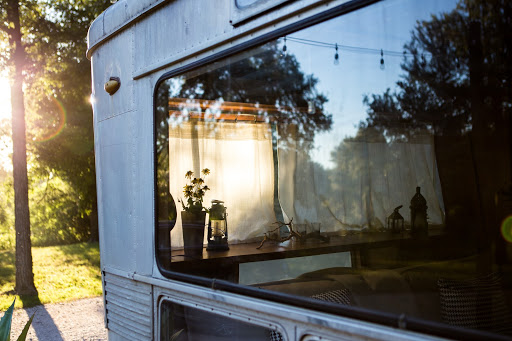
Over 1.7 billion people live off-grid worldwide, and that number is increasing every year as more and more people feel the need to detach from modern urban environments. Off the grid living is very environmentally conscious and typically more frugal than living in a city.
Owning a mobile home is one of the most popular ways to build a life off the grid, while still maintaining a lot of necessary modern conveniences.
What is Living Off the Grid?
Off the grid (OTG) living refers to a self-sufficient lifestyle that doesn't rely on public utilities like the electrical power grid, municipal water supply, sewerage or gas services. Instead, individuals in this lifestyle source for their water, use solar energy (or other green energy alternatives), cook with biogas, and build their own sewerage system.
People who live off the grid also strive to sustain the ecosystems in their environment by planting their food using organic manure and leaving a minimal carbon footprint.
What is a Mobile Home?
Mobile homes are prefabricated homes that can be transported to its permanent location for occupation as a regular dwelling. Investing in a mobile home gives one freedom because they can set up house as far away from the general population as they'd like. That's what makes it ideally suited for a relatively simple approach to off-the-grid living.
Related: What Questions You Should Ask Before Buying a Mobile Home
The Benefits of Off the Grid Living

OTG has numerous benefits not only to the environment but also to those living the lifestyle.
Reduction in living costs
Living off the grid typically forces you to install a solar panel or pursue another renewable source of energy to cater to their energy needs. Nowadays, especially in the Western world which benefits from a lot of subsidies, going solar is much cheaper in the long-run.
Off-the-grid living naturally invites a more conservative lifestyle as well - you don't typically equate “energy-burning" and "off the grid" in the same sentence.
A healthy environment
Living off the grid allows one to exist better with the environment. An individual uses less, so they produce less waste, and their actions do not pollute the water sources or plants and animals around. For example, the garden is fertilized by compost fertilizer that is created in the backyard, not chemical fertilizer that finds its way into water sources come the rainy season.
A flexible lifestyle
An OTG lifestyle allows one to settle virtually anywhere in the world and live in strict accordance with their own values and interests. Off the grid living can be sustained in a rural area and even, perhaps surprisingly, in the city.
While living off the grid in the city is not as fully immersive as the rural experience, it's still a great place to start the journey.
Why Choose a Mobile Home for Off the Grid Living?

The obvious advantage a mobile home offers is the advantage of selecting a location where one can comfortably sustain their lifestyle. There are, however, several more advantages of choosing a mobile home when switching to OTG living.
Practicality
A mobile home can be made to accommodate any housing needs, from being a family home to a single person's dwelling. Families can get designs that are customizable and allow expansion of the family.
Affordability
Compared to brick and mortar houses, these homes are cheaper and appeal to people on a budget. Being affordable doesn't mean poor quality - many reputable manufacturers create exceptional avant-garde designs that are aesthetically pleasing.
Mobility
One can relocate with the mobile home to another state comfortably, especially if the individual's home state has prohibitions about living off the grid. They can move their home and family elsewhere and build a sustainable lifestyle in their new surroundings.
Aesthetics
Mobile homes can have many different aesthetics. Because of the location of the house, you can decide to be adventurous in the design - a quirky design probably isn't going to affect the general aesthetics of an off-grid neighborhood.
Eco-friendly building material
Mobile homes can be built using eco-friendly materials, making them a great option for people switching looking to minimize their carbon footprint across the board.
How to Take a Mobile Home Off the Grid

While mobile homes offer a fairly straightforward route off the grid (compared to other options), it still requires a fair amount of consideration and builds up to a successful move.
Install power
To power the mobile home, one has several choices.
To begin with, there’s solar energy that is harnessed and stored in solar panels. The solar panels are exposed to the sun, absorbing the sunlight through photovoltaic cells. They then generate a direct current that is routed into the house as alternating current and used on appliances.
Another option is wind energy, especially for homeowners on a vast, flat expanse of land. Residential wind power can be harnessed by large turbines standing at between 80 and 150 feet tall. The tall towers capture the wind even above windbreakers like trees. The wind rotates propellers on the turbine, which causes an attached rotor to spin the generator and produce power. For this option to work, make sure the area experiences wind speeds of at least nine mph.
Pro tip:
Don't succumb to using a regular generator to power the home. First, it’s an expensive habit to sustain, and second, it is not environment-friendly. Instead, hire a professional to set up the solar panels. It may take longer to get the solar panels, but in the long run, they are cheaper and more effective.
Find water
For OTG living believers who want to completely delink from government utilities, finding a water source is crucial to the sustainability of their lifestyle. One can use rainwater during the rainy season and build or buy storage facilities to store large amounts of water for later use. The other option which may be more sustainable regardless of the season is sinking a well, but you’d have to own the land to go this route.
To draw water from the well, a homesteader can use a hand pump or solar/wind-powered pumps.
Pro tip:
Do not depend on city water because not only is it proven to have some contaminants, it can be unreliable, especially when a massive storm hits the area and takes out infrastructure. Plus, city water takes away the self-reliance that most seek in the OTG lifestyle.
Insulate it
There is some insulation that one can expect from the manufacturer of the mobile home. In some instances, when the homeowner knows exactly what weather conditions they will be living in, they can pre-order the insulation and have it fixed by the manufacturer.
On the other hand, you might want to do it yourself. The advantage of getting the insulation done by a professional is that the homeowner is assured of a professional job so they can save their energy usage. DIY insulation projects can succeed, but in most cases, they fall short in some areas.
Nonetheless, here are the crucial areas to focus attention on during DIY insulation:
-
The roof
The best roof insulation is a warm roof. This is where one installs insulation between the rafters keeping the rafter timbers warm.
Alternatively, one can use Icynene, which is a spray form insulation that expands to 100 times its initial size when sprayed covering even the tiny spaces in the roof. Icynene features an open cell structure which makes it breathable. It allows the house to breathe naturally while preventing internal condensation. This is a great eco-friendly solution.
Pro tip:
Choose an insulation option for the roof that keeps the roofing material intact. Some options can cause the roof to begin leaking prematurely, especially if it is a metal roof because they contain corrosive materials.
-
The walls
There are several eco-friendly options for wall insulation, including sheep wool which is popular because of its water-resistant quality. Sheep's wool is excellent because it is organic and also keeps the house warm in the winter and cools during the summer months. The wool fibers are compressed and form little air pockets which makes it breathable, so there is no condensation.
Icynene can be used on the walls as well. Polystyrene is a plastic that is used as spray foam or rigid foam boards. Polystyrene offers exceptional insulation making the mobile home energy efficient. As a result, the homeowner spends less energy, even if it is solar energy.
For OTG enthusiasts who want a negative carbon print, the best insulation material is the Thermacork. This material is made from the outer bark of oaks, so it is not only recyclable, but it's also biodegradable. On top of that, it cancels out any noise.
Pro tip:
Many insulation professionals talk highly about fiberglass, but it is an expensive option, and you can usually find the same standard of insulation with cheaper options.
-
Doors and windows
Windows and doors can be insulated using film insulation, spray foam, and thermal curtains.
Weatherstrips help to seal off the door and windows keeping out the draught. One can also apply rigid foam insulation to weatherize the windows.
Pro tip
Insulated curtains are a great addition to the house even if you have insulated the windows. They help keep the house warm in the winter and cool in the summer.
Related: Preventing Window Condensation
-
Water ducts and vents
Traditional pipe wrap insulation works fine to protect the house pipes from being damaged by the cold weather. There is a wide variety of materials to choose from for the wrap, including foil-backed natural cotton, foam and foil, bubble film, or rubber pipe insulation tape, among others.
The main reason for insulating the ductwork of the house is to prevent energy from being lost through the ducts or vents. Also, the insulation prevents condensation build-up and temperature drops.
Pro tip
Make sure you also insulate the plumbing for the same reason. Ignoring insulation in these areas can cause the homeowner to lose 10% to 30% energy.
-
Plan for Sewage disposal
Sewage is a raw topic (pun intended), but it's relatively straightforward to handle it on your own.
Installing a septic tank is the best option. A septic tank can be a large metal tank buried deep in the ground but connected to the toilet. The septic tank releases the wastewater into a drain field, so one doesn't see the process of sewage disposal. Once a year you'll need to call a professional sewage disposal company to empty it and clean it out
Other people prefer a composting toilet also known in some places as the pit latrine. Composting toilets are free-standing and can serve for years because they decompose matter naturally.
Pro tip:
Don't depend on the city sewage disposal system. Having one in the compound makes the home self-sufficient, and in case of any disruptions to sewerage services, the homeowner isn't affected. Also, ensure that the septic tank is installed by professionals to avoid leakages that can contaminate drinking water.
-
Plan for waste disposal
The best thing about living off the grid is that it drastically reduces the amount of waste produced, and most of the waste is plastic-free. Plastic doesn't decompose, but the rest of the garbage can be managed in a compost pit to create organic compost for the garden. The rest can be burned.
To make waste disposal manageable, recycling should be the order of the day. Do not throw away plastic containers. Instead, use them to pack groceries when shopping for supplies. If there are too many, take them to a recycling center.
Food is the second most wasted item in households - so make sure all leftover food goes into the compost pit.
Pro tip:
There is always a recycling center that can take more plastics. Do not haul them off to landfills before exploring this option.
Takeaway

Mobile homes are a fantastic option for those pursuing an off-the-grid lifestyle. We’ve walked through almost all of the major considerations that’ll make living off the grid in a mobile home enjoyable and worth the shift.
Don't forget to invest in energy-efficient appliances to bring it all full circle. Consider gas refrigerators, solar cookers, gas heater, energy-efficient bulbs, and washing clothes in cold water then air dry. Good luck!
Related: 8 Reasons to Buy a Mobile Home





